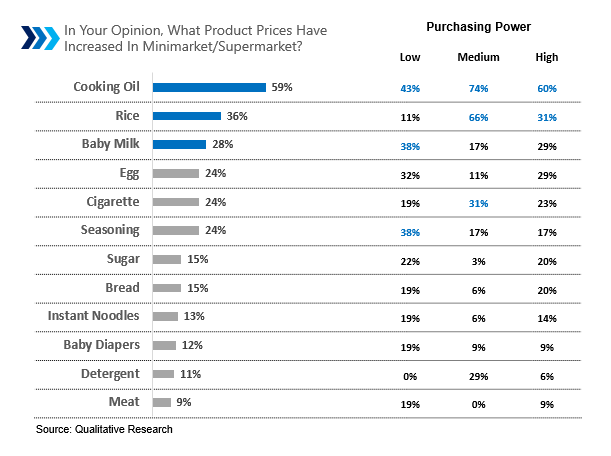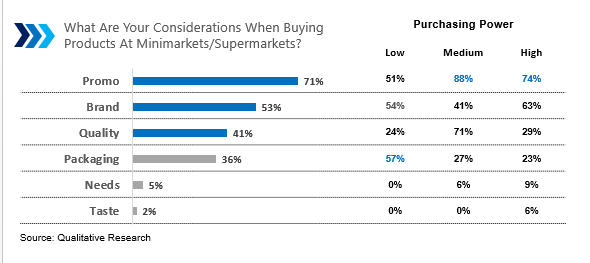The increase in the price of fuel oil (BBM) has an impact on the increase in the price of goods. This is reflected in the inflation rate in September 2022 which annually reaches 5.95% from the realization in August 2022 of 4.69%. The inflation rate is inseparable from the impact of the increase in fuel prices which not only has an impact on the price increase in transportation fares as part of the sector that is directly affected (the first round effect), but also causes the prices of goods to rise due to the indirect impact (the second round effect).

In this study, PT Global Loyalty Indonesia (GLI) wanted to see how the impact of inflation on people's purchasing power, especially on daily needs sold in minimarkets/supermarkets. We surveyed 108 respondents, and divided them into three levels of purchasing power, namely low purchasing power with 38 respondents, medium purchasing power with 35 respondents, and high purchasing power with 35 respondents.
Majority of consumers feel that the prices of products in minimarkets/supermarkets have increased, especially the prices of cooking oil, rice, and milk. For consumers with low purchasing power, they feel that seasoning (chili, onions, condiments) has increased. Meanwhile, consumers with medium purchasing Power feel that the price of cigarettes has increased.

In response to price increases, the majority of consumers reduce the number of products purchased. In contrast to consumers with high purchasing power, they tend to look for cheaper stores. The maximum price increase they can tolerate is around IDR 2,500 – IDR 5,000.


The main considerations of consumers in shopping are promos, brands, and quality. The interesting thing is that consumers with low purchasing power are more concerned about packaging.

When there is a promo, consumers with medium-high purchasing power tend to shop according to their needs. Meanwhile, consumers with low purchasing power tend to shop in large quantities for stock.

In choosing packaging, the majority of consumers consider the content/volume of the packaging more than the packaging design.
Interestingly, consumers with low purchasing power prefer reduced package content to product price increases. Meanwhile, consumers with middle to high purchasing power prefer a product price increase rather than a reduction in package contents.
The majority of consumers reduce their shopping consumption, especially in shopping for snacks, RTD juice/coffee/milk, and cigarettes. Meanwhile, consumers with low purchasing power also reduce meat consumption.

Consumers tend to reduce their purchases of snacks, RTD juice/coffee/milk, and instant noodles because they are not important, and they can buy other more important things. Consumers tend to reduce the purchase of cigarettes because to maintain their health or not good if consumed frequently. Consumers tend to reduce spending on meat and eggs because they are expensive. Consumers tend to reduce their purchases of detergent and cooking oil because they can reduce the amount of usage/consumption, or buy smaller ones/sachets.
The most trusted brand is Bimoli, followed by SunCo. This shows that the cooking oil brand is the brand most trusted by consumers, even though the price goes up, they will still buy it.

We hope these insights and data are beneficial for you. Suppose you want to know more about your product, we can help you because we have more than 11 million members with millions of daily transactions for analysis, such as consumer behavior and other product data.





